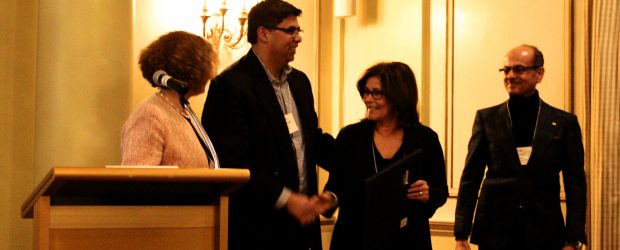By: Brian Jackson. Editorial director of IT World Canada.
Image (left to right): Yasemin Sezer, CIO Association, Toronto Chapter, Dawood Khan, founder of TransformationWorx
congratulates one of the first graduates of the blockchain certification, along with Husam Sha’ath of Forte Management Consulting.
If blockchain technology is really going to grow beyond Bitcoin and be a disruptive force of change in the business world, then at least there’s a dozen or so more people in Toronto that are ready for it.
Those would be the first graduates of a CIO Certified Blockchain Professional (CCBP) program hosted by TransformationWorx in partnership with the CIO Association of Canada and is recognized by the Institue of Management Consultants. Including C-suite level executives, the students took part in an intense two days of interactive workshops on blockchain topics ranging from Bitcoin to smart contracts. Then they had to pass the rigors of an exam and a capstone project that applied blockchain technology to a real-world business challenge.
With IT analyst firms such as Gartner predicting that blockchain technology will grow to add $176 billion in business value by 2025 and Deloitte publishing reports on guiding principles around adoption, this emerging technology is definitely peaking on the hype curve. But that’s for good reason, says Dawood Khan, the founder of TransformationWorx, and a partner at Red Mobile.
“This is a once in a lifetime moment where you’re at the precipice of history,” he says. “There was a revolution 100 years ago with the industrial revolution and there were some micro-revolutions with the Internet and the PC, but this for me is the biggest revolution since the industrial revolution.”
The power of blockchain’s technology is distributed nature, he explains. No central authority is required to manage a system, as is common in today’s experience with the Internet. For example, Google determines what websites we see when we conduct a search, Facebook hosts our images so family and friends can see them, and Amazon connects us to a network of sellers for goods we want to buy.
“It democratizes access to value transfer,” Khan says. “It equates people in Venezuala, whose currency is fluctuating, to a more stable decentralized and distributed ways of communicating. It provides control and ownership of data to the end user.”
Designed to provide a foundational understanding of blockchain, the certification covers crypto-currencies such as Bitcoin and Ethereum. Other types of blockchains such as Hyperledfer Fabric are also covered. Students learn about how to fund a business with an initial coin offering, as well as governance models for using blockchain in the enterprise.
About 90 participants have been through the program so far, Khan says. There were six cohorts in 2017, and there will be another six cohorts just in the first quarter of 2018 as the program expands. He expects to see high demand, as last year the last four of the six bootcamps were sold out.
Two of the recent graduates, framed certificates in hand, agreed that they learned a lot from the course and said they’d recommend it to peers.
“I took the course to use as a stepping stone to move from the business side to the technical side,” says Kamna Krishnan, a business associate at a bank. “Blockchain is the talk of the town, so I wanted to learn more.”
Karsten Arend, working with McLaren Resources, took the course to bolster his knowledge of blockchain as his firm is raising funding to develop a blockchain platform for use in the mining industry.
“Anyone who is a CIO should be looking at this,” he said. “A lot of people in the C-level that want to see where most industries will be going in the next four or five years, this is a good idea.”
Arend appreciated how the course featured speakers that shared their experiences with blockchain and what benefits they couldn’t have realized without it.
Krishan points out that the final project of the course educates students about when it’s appropriate to use blockchain and when a traditional database is better.
“You have to think about the situation to see if blockchain is really useful to that or not,” she says.
The TransformationWorx program offers a business stream and an executive stream. At the time of press, the next two-day course available is Jan. 30-31 and the price of registration is $3,795. Upcoming programs include:
- Executive series on Blockchain Applications (Starting Feb 2018)
- Cryptocurrencies and ICO Securities Law and Regulations Course (Starting April 2018)
- Blockchain Solutions Architecture Course (Starting June 2018)
This post, by Brian Jackson, first appeared in ITWorld Canada on January 27, 2018. Brian is Editorial director of IT World Canada. Covering technology as it applies to business users. Multiple COPA award winner and now judge. Paddles a canoe as much as possible. Follow Brian on Twitter here.
